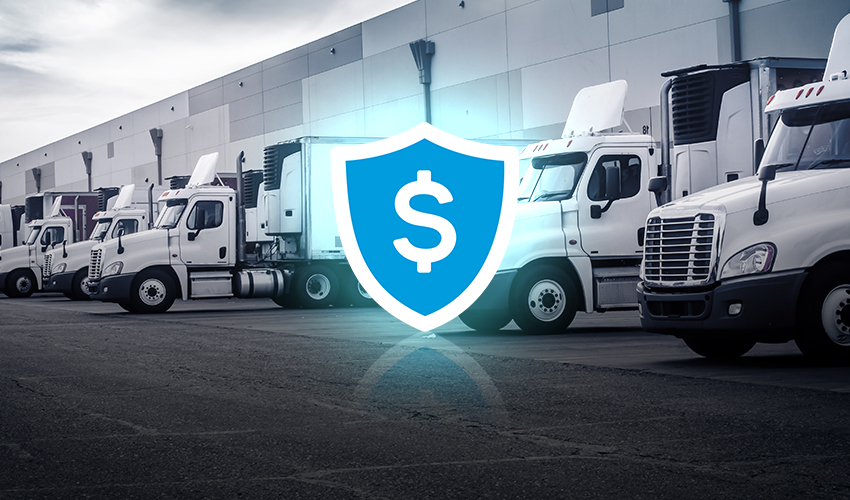Fleet Vehicle Insurance: Your Guide to Peace of Mind

Auto fleet insurance premiums represent a significant outlay for transportation companies. It’s important to understand the types of fleet vehicle insurance policies in addition to what each policy type covers. We’ll walk through the basics as well as tell you what you need to know about fleet insurance.
What is fleet insurance?
Fleet insurance is a commercial policy that covers all of an organization’s vehicles. What constitutes a fleet varies from provider to provider, but policies are available for companies with as few as two or three vehicles.
How does fleet insurance work?
Fleet auto insurance coverage allows you to cover multiple vehicles on one policy, even if they aren't all used for the same purpose.
Fleet insurance policies cover the following types of vehicles:
-
Cars
-
Taxis
-
Vans
-
SUVs
-
Busses
-
Trucks
-
Trailers
-
HGVs
What does fleet insurance cover?
State and federal laws stipulate that all fleet vehicles have commercial insurance with liability compliance. To avoid potential penalties, consider checking the fleet insurance requirements that apply to you before choosing a policy.
Most fleet insurance policies will require liability coverage for:
-
Bodily injury - Covers the costs of injuries or death due to an accident where your business was at fault. This may also include legal defense, depending on the policy.
-
Property damage - Covers the cost of damages to any privately or commercially owned property by one of your vehicles
While these are usually the minimum requirements of fleet insurances, many insurers offer additional protection by providing coverage for:
-
Roadside assistance – Nothing affects the bottom line like a disabled vehicle and driver. Every minute they are left out of service means lost revenue. Whether it be a flat tire, a dead battery, or a need for fuel, roadside assistance coverage can help get your drivers back up and running as quickly as possible given unexpected downtime.
-
Physical damage – Imagine one of your drivers showing up to the yard, only to find a tree toppled onto their vehicle in the night. While liability insurance protects your vehicles from any events caused by your drivers, your fleet is still vulnerable to other potential damages outside of your control. Physical damage coverage insulates your fleet from damages resulting from weather, theft, or vandalism.
-
Collision coverage – Unfortunately, collision risk only increases with the number of vehicles in a fleet. Collision coverage protects you from costs associated with repair bills if one of your vehicles is hit by another vehicle or object.
-
Uninsured driver coverage – Uninsured driver coverage keeps you protected in the event of a collision with an uninsured driver, preventing you from paying out of pocket for costly repairs or medical expenses.
Types of company fleet insurance
The type of fleet auto insurance you need will depend on your business type and the industry you operate in. Not every vehicle you own needs to sit in the same category to be covered. Typically, a majority rule is applied to fleet insurance services. Examples include:
-
Taxi fleet insurance
-
Light goods fleet insurance
-
Minibus fleet insurance
-
Hazardous goods fleet insurance
-
Haulage fleet insurance
-
Courier fleet insurance
Who does fleet insurance cover?
Some vehicle fleet insurance policies cover any of your employees to drive any of your vehicles. Others require a comprehensive list of every employee authorized to drive each vehicle or vehicle type. In the latter case, fleet managers need to ensure that employee records are accurate and up to date so that fleet insurance claims can be processed without complications or delays.
How to choose the right fleet insurance coverage
Comprehensive fleet insurance policies cover more but they might also cost you more. It’s worth taking an in-depth look at the specific risks associated with your line of business and the types of assets that comprise your fleet.
Data is invaluable in this process, as it should tell you everything you need to know about your fleet utilization and safety metrics. Modern-day fleet management software can provide all of the relevant details for your insurance provider at the touch of a button. Plus, as it constantly measures all areas of performance, you may be able to identify areas of improvement that could reduce your policy costs when it comes to renewal.
How much does fleet insurance cost?
Commercial fleet insurance costs vary depending on the type and scale of your business. Here are some considerations:
-
Vehicle age and value – New or custom vehicles are more expensive to insure than older, used vehicles.
-
Vehicle type and size – Smaller vehicles like cars and minivans are less expensive to insure than busses and trucks. Plus, trucks have an extra layer of classification into light-, medium-, or heavy-duty models that will also affect cost.
-
Vehicle use – Vehicles used to provide services are usually the cheapest to insure, followed by retail vehicles like delivery vans. The most expensive policies are those that cover the transportation of passengers or goods.
Tips to save money on fleet insurance
One way to save on insurance is to raise your deductible amount. However, this could result in more costly fleet insurance claims. Most other cost-saving strategies involve improved safety. Again, fleet management risk software is a bonus here as telematics systems provide detailed insights and provide proof of reduced distracted driving, risky driving behaviors, and collisions. Inbuilt GPS also acts as anti-theft equipment, which could further reduce your policy costs.
Lytx provides a range of fleet management solutions that can actively help reduce the cost of your fleet insurance. Not sure which products are right for your business? Contact our team to discuss your options, and we’ll provide custom fleet management recommendations that are best matched to the needs of your business.

